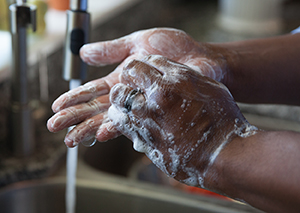What Is C. Diff?
C. diff is an infection caused by C. diff (Clostridioides difficile) bacteria. These are germs that live in the part of your belly called your colon, or large intestine. They don't often cause problems. But if the normal balance of good and bad bacteria in your colon changes, C. diff bacteria can grow out of control and lead to infection. This can harm your colon and cause diarrhea and belly pain.
What are the symptoms of C. diff?
Symptoms can include:
-
Watery diarrhea
-
Fever
-
Belly pain and cramping
-
Nausea and vomiting
-
Loss of appetite and weight loss
Some people with C. diff have no symptoms, but they can still pass the infection to others.
Who is at risk of getting C. diff?
Anyone can get C. diff. But you are more likely to get the infection if you:
-
Are age 65 or older
-
Are taking antibiotics
-
Have a weak immune system because of other health problems
-
Have inflammatory bowel disease
-
Have had C. diff before
-
Have had gastrointestinal (GI) surgery
-
Work or are a patient in a hospital, clinic, or nursing home
Can C. diff come back?
After treatment, C. diff can come back in about 1 in 6 people over the next 2 to 8 weeks. If C. diff does come back, you are at higher risk for infection again in the future.
How can I lower my chance of getting C. diff again?
Take your C. diff treatment exactly as prescribed. This may include a 10- to 14-day treatment or a course of treatment with decreasing doses over 5 to 6 weeks. If you get C. diff again or it comes back after treatment, ask about new therapies that may be available to treat the infection and lower the chance of relapse. In some cases, your treatment may be a fecal transplant. This is where stool from a healthy person is introduced into your colon to replace the good bacteria that you have lost.
Take antibiotics only when you really need them. Antibiotics don't help treat illnesses caused by viruses, such as colds and the flu. Don't ask for antibiotics from your healthcare provider if they say they won't work.
Take safety steps if you come into contact with others who have C. diff. Wear gloves when touching them or their body fluids. Wash your hands with soap and water after contact. Alcohol-based hand cleaners don't work against C. diff.
How can I stop the spread of C. diff?

C. diff can easily spread to other people in your home or workplace. The germs can stay on your hands after using the bathroom, then spread to any person, surface, or object you touch. Here's how to not spread C. diff to other people:
-
Practice good handwashing. This is especially important after using the bathroom and before eating. Here's what to do: Wet your hands, scrub them with soap for 30 to 40 seconds, then rinse well and dry.
-
Wash your clothes, bed sheets, and towels in separate loads. Use hot water. Use both detergent and chlorine bleach.
-
Use chlorine bleach-based products to disinfect surfaces you touch often, such as tabletops, light switches, doorknobs, and toilet seats.
-
Remind others to wear gloves and to wash their hands if they are helping you in the bathroom.